Mental Health and Social Work Impact
VerifiedAdded on 2020/06/03
|10
|2861
|175
AI Summary
This assignment delves into the profound impact of mental illness on individuals, families, and professional lives. It highlights the crucial role of social workers in alleviating suffering caused by stigma, discrimination, and inadequate support systems. The student analyzes various mental health disorders and their consequences, demonstrating a commitment to upholding professional values and advocating for vulnerable individuals' rights.
Contribute Materials
Your contribution can guide someone’s learning journey. Share your
documents today.
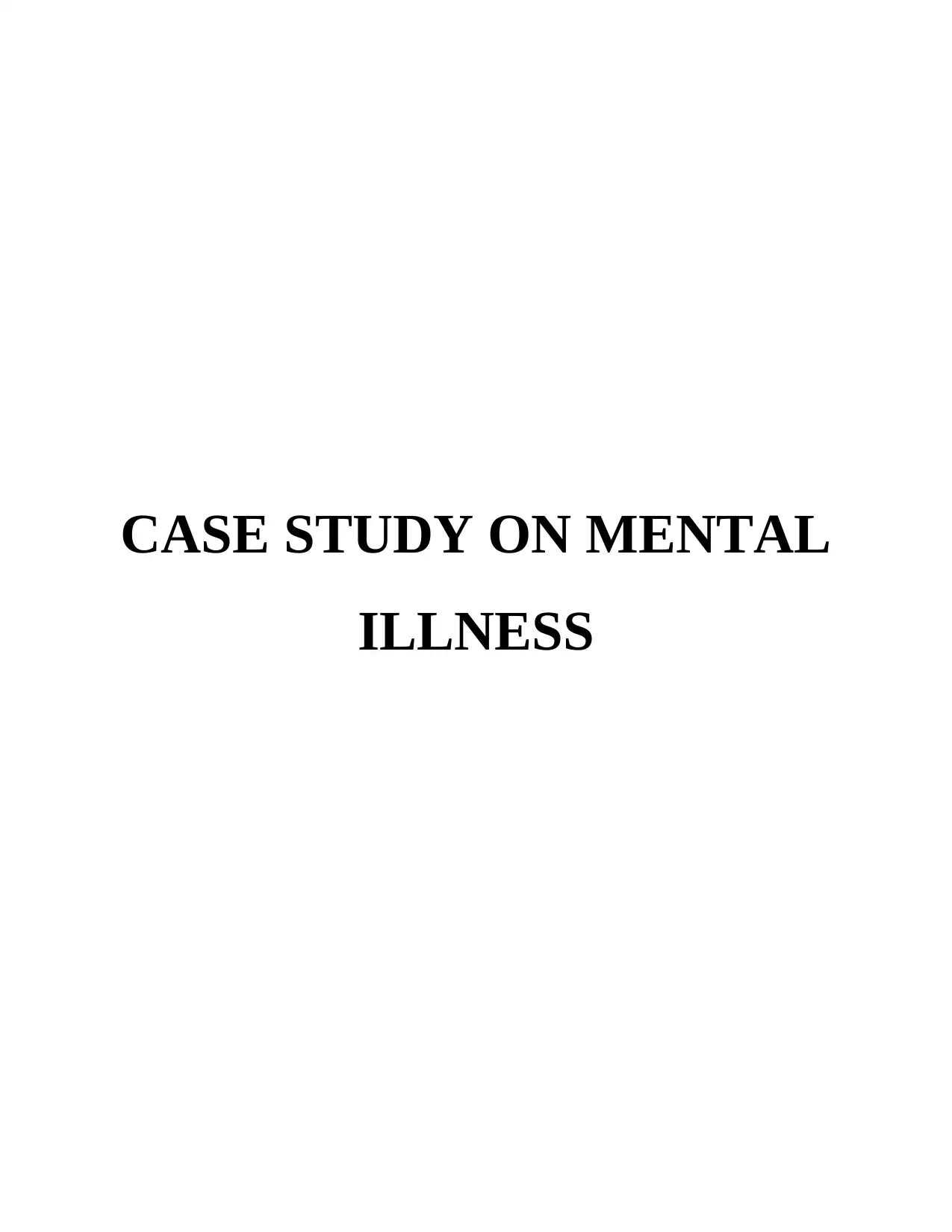
CASE STUDY ON MENTAL
ILLNESS
ILLNESS
Secure Best Marks with AI Grader
Need help grading? Try our AI Grader for instant feedback on your assignments.
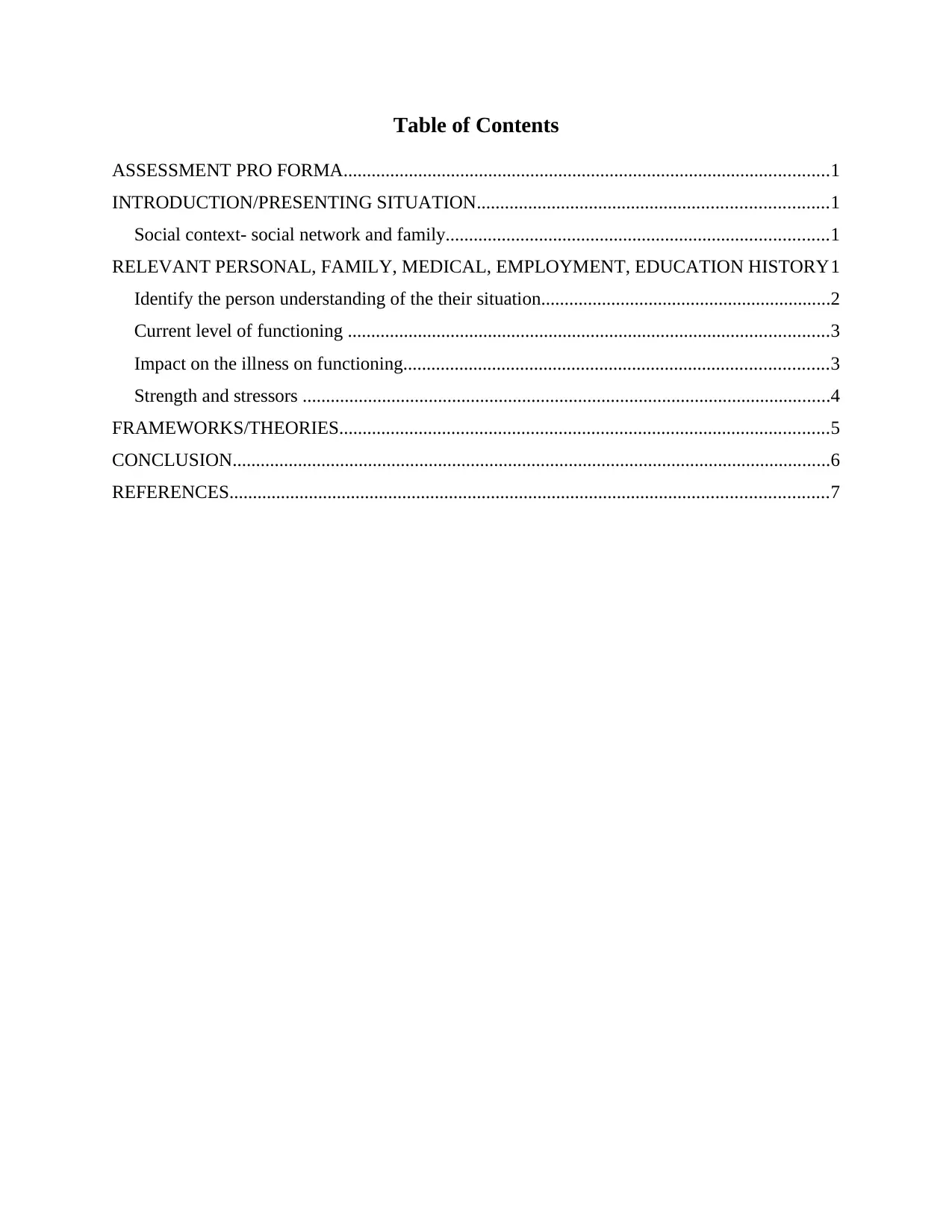
Table of Contents
ASSESSMENT PRO FORMA........................................................................................................1
INTRODUCTION/PRESENTING SITUATION...........................................................................1
Social context- social network and family..................................................................................1
RELEVANT PERSONAL, FAMILY, MEDICAL, EMPLOYMENT, EDUCATION HISTORY1
Identify the person understanding of the their situation..............................................................2
Current level of functioning .......................................................................................................3
Impact on the illness on functioning...........................................................................................3
Strength and stressors .................................................................................................................4
FRAMEWORKS/THEORIES.........................................................................................................5
CONCLUSION................................................................................................................................6
REFERENCES................................................................................................................................7
ASSESSMENT PRO FORMA........................................................................................................1
INTRODUCTION/PRESENTING SITUATION...........................................................................1
Social context- social network and family..................................................................................1
RELEVANT PERSONAL, FAMILY, MEDICAL, EMPLOYMENT, EDUCATION HISTORY1
Identify the person understanding of the their situation..............................................................2
Current level of functioning .......................................................................................................3
Impact on the illness on functioning...........................................................................................3
Strength and stressors .................................................................................................................4
FRAMEWORKS/THEORIES.........................................................................................................5
CONCLUSION................................................................................................................................6
REFERENCES................................................................................................................................7

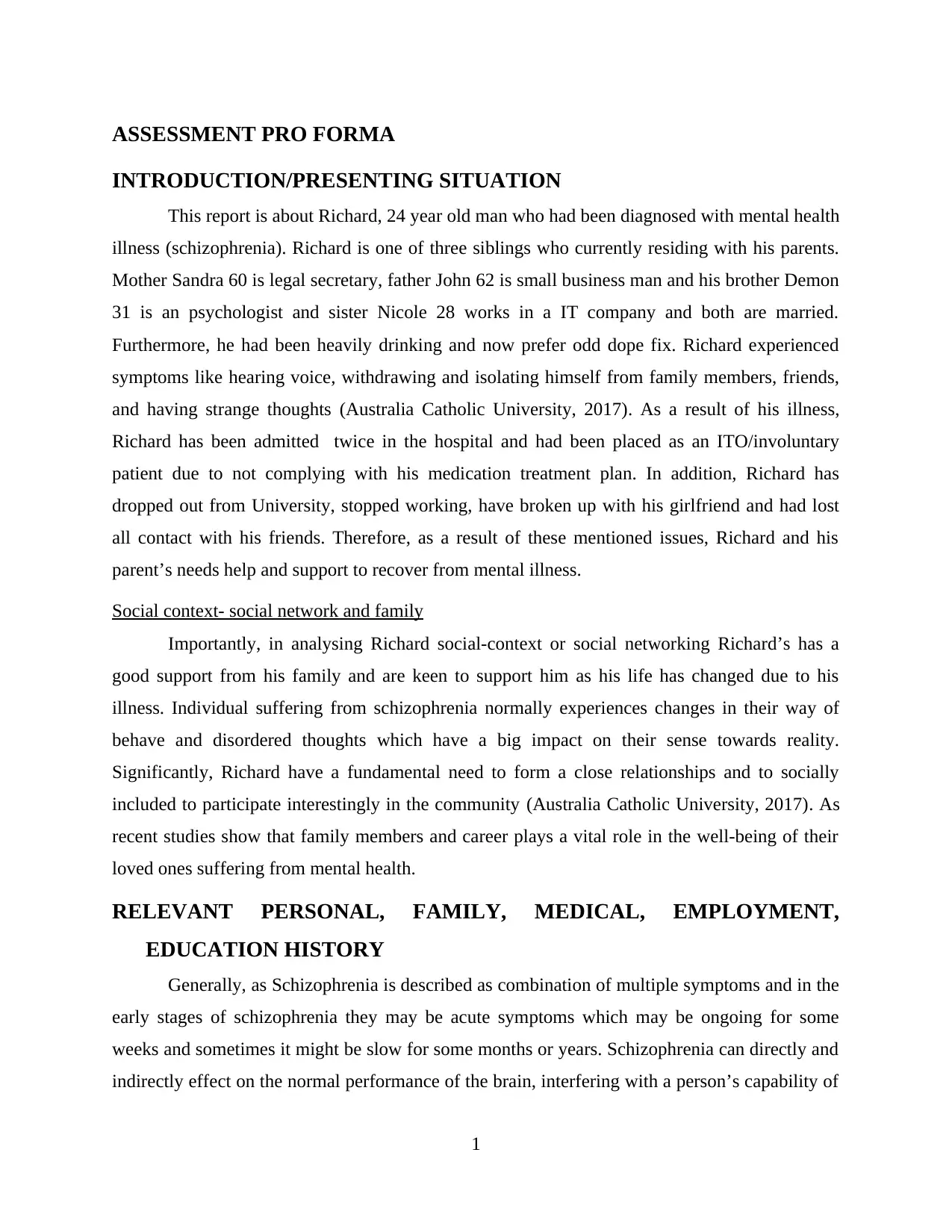
ASSESSMENT PRO FORMA
INTRODUCTION/PRESENTING SITUATION
This report is about Richard, 24 year old man who had been diagnosed with mental health
illness (schizophrenia). Richard is one of three siblings who currently residing with his parents.
Mother Sandra 60 is legal secretary, father John 62 is small business man and his brother Demon
31 is an psychologist and sister Nicole 28 works in a IT company and both are married.
Furthermore, he had been heavily drinking and now prefer odd dope fix. Richard experienced
symptoms like hearing voice, withdrawing and isolating himself from family members, friends,
and having strange thoughts (Australia Catholic University, 2017). As a result of his illness,
Richard has been admitted twice in the hospital and had been placed as an ITO/involuntary
patient due to not complying with his medication treatment plan. In addition, Richard has
dropped out from University, stopped working, have broken up with his girlfriend and had lost
all contact with his friends. Therefore, as a result of these mentioned issues, Richard and his
parent’s needs help and support to recover from mental illness.
Social context- social network and family
Importantly, in analysing Richard social-context or social networking Richard’s has a
good support from his family and are keen to support him as his life has changed due to his
illness. Individual suffering from schizophrenia normally experiences changes in their way of
behave and disordered thoughts which have a big impact on their sense towards reality.
Significantly, Richard have a fundamental need to form a close relationships and to socially
included to participate interestingly in the community (Australia Catholic University, 2017). As
recent studies show that family members and career plays a vital role in the well-being of their
loved ones suffering from mental health.
RELEVANT PERSONAL, FAMILY, MEDICAL, EMPLOYMENT,
EDUCATION HISTORY
Generally, as Schizophrenia is described as combination of multiple symptoms and in the
early stages of schizophrenia they may be acute symptoms which may be ongoing for some
weeks and sometimes it might be slow for some months or years. Schizophrenia can directly and
indirectly effect on the normal performance of the brain, interfering with a person’s capability of
1
INTRODUCTION/PRESENTING SITUATION
This report is about Richard, 24 year old man who had been diagnosed with mental health
illness (schizophrenia). Richard is one of three siblings who currently residing with his parents.
Mother Sandra 60 is legal secretary, father John 62 is small business man and his brother Demon
31 is an psychologist and sister Nicole 28 works in a IT company and both are married.
Furthermore, he had been heavily drinking and now prefer odd dope fix. Richard experienced
symptoms like hearing voice, withdrawing and isolating himself from family members, friends,
and having strange thoughts (Australia Catholic University, 2017). As a result of his illness,
Richard has been admitted twice in the hospital and had been placed as an ITO/involuntary
patient due to not complying with his medication treatment plan. In addition, Richard has
dropped out from University, stopped working, have broken up with his girlfriend and had lost
all contact with his friends. Therefore, as a result of these mentioned issues, Richard and his
parent’s needs help and support to recover from mental illness.
Social context- social network and family
Importantly, in analysing Richard social-context or social networking Richard’s has a
good support from his family and are keen to support him as his life has changed due to his
illness. Individual suffering from schizophrenia normally experiences changes in their way of
behave and disordered thoughts which have a big impact on their sense towards reality.
Significantly, Richard have a fundamental need to form a close relationships and to socially
included to participate interestingly in the community (Australia Catholic University, 2017). As
recent studies show that family members and career plays a vital role in the well-being of their
loved ones suffering from mental health.
RELEVANT PERSONAL, FAMILY, MEDICAL, EMPLOYMENT,
EDUCATION HISTORY
Generally, as Schizophrenia is described as combination of multiple symptoms and in the
early stages of schizophrenia they may be acute symptoms which may be ongoing for some
weeks and sometimes it might be slow for some months or years. Schizophrenia can directly and
indirectly effect on the normal performance of the brain, interfering with a person’s capability of
1
Secure Best Marks with AI Grader
Need help grading? Try our AI Grader for instant feedback on your assignments.
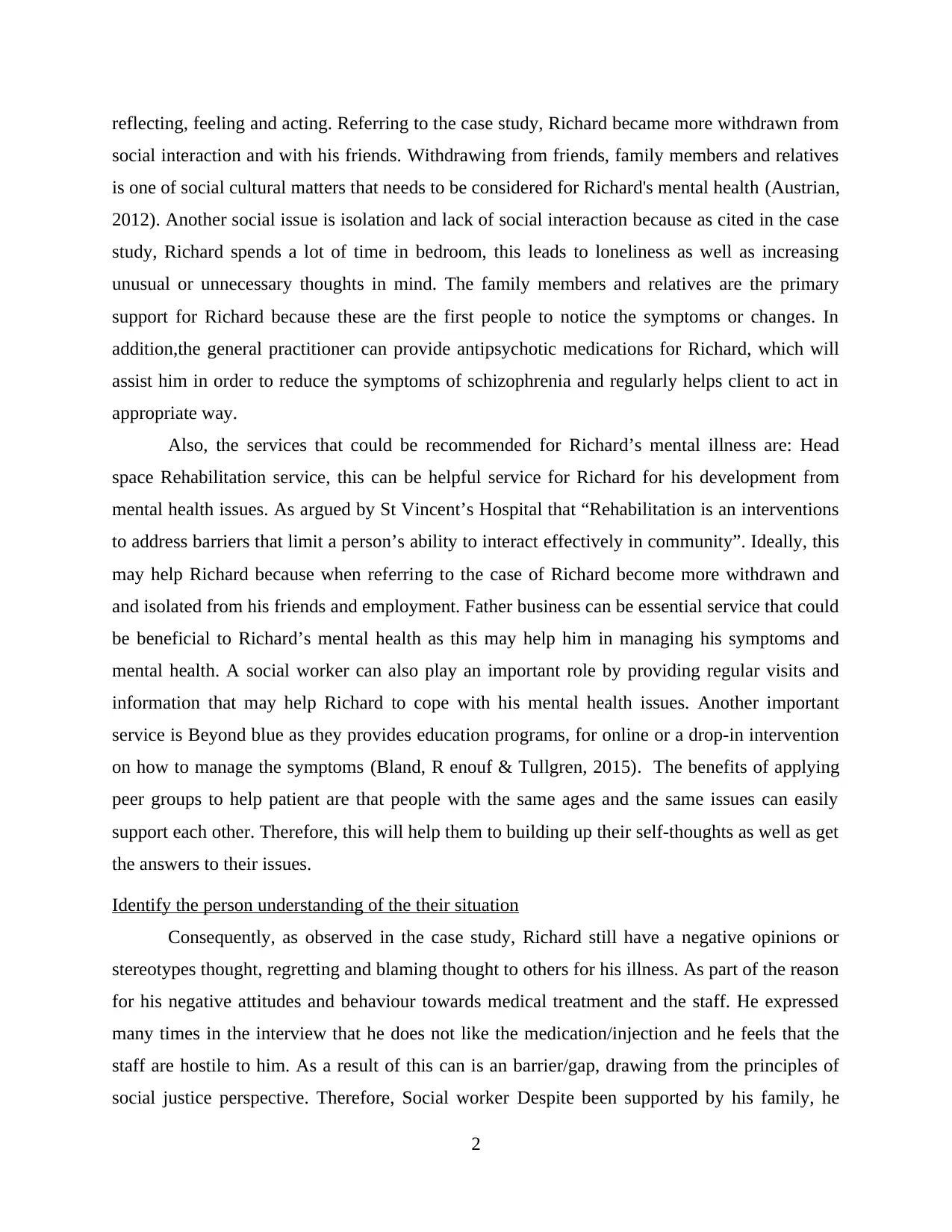
reflecting, feeling and acting. Referring to the case study, Richard became more withdrawn from
social interaction and with his friends. Withdrawing from friends, family members and relatives
is one of social cultural matters that needs to be considered for Richard's mental health (Austrian,
2012). Another social issue is isolation and lack of social interaction because as cited in the case
study, Richard spends a lot of time in bedroom, this leads to loneliness as well as increasing
unusual or unnecessary thoughts in mind. The family members and relatives are the primary
support for Richard because these are the first people to notice the symptoms or changes. In
addition,the general practitioner can provide antipsychotic medications for Richard, which will
assist him in order to reduce the symptoms of schizophrenia and regularly helps client to act in
appropriate way.
Also, the services that could be recommended for Richard’s mental illness are: Head
space Rehabilitation service, this can be helpful service for Richard for his development from
mental health issues. As argued by St Vincent’s Hospital that “Rehabilitation is an interventions
to address barriers that limit a person’s ability to interact effectively in community”. Ideally, this
may help Richard because when referring to the case of Richard become more withdrawn and
and isolated from his friends and employment. Father business can be essential service that could
be beneficial to Richard’s mental health as this may help him in managing his symptoms and
mental health. A social worker can also play an important role by providing regular visits and
information that may help Richard to cope with his mental health issues. Another important
service is Beyond blue as they provides education programs, for online or a drop-in intervention
on how to manage the symptoms (Bland, R enouf & Tullgren, 2015). The benefits of applying
peer groups to help patient are that people with the same ages and the same issues can easily
support each other. Therefore, this will help them to building up their self-thoughts as well as get
the answers to their issues.
Identify the person understanding of the their situation
Consequently, as observed in the case study, Richard still have a negative opinions or
stereotypes thought, regretting and blaming thought to others for his illness. As part of the reason
for his negative attitudes and behaviour towards medical treatment and the staff. He expressed
many times in the interview that he does not like the medication/injection and he feels that the
staff are hostile to him. As a result of this can is an barrier/gap, drawing from the principles of
social justice perspective. Therefore, Social worker Despite been supported by his family, he
2
social interaction and with his friends. Withdrawing from friends, family members and relatives
is one of social cultural matters that needs to be considered for Richard's mental health (Austrian,
2012). Another social issue is isolation and lack of social interaction because as cited in the case
study, Richard spends a lot of time in bedroom, this leads to loneliness as well as increasing
unusual or unnecessary thoughts in mind. The family members and relatives are the primary
support for Richard because these are the first people to notice the symptoms or changes. In
addition,the general practitioner can provide antipsychotic medications for Richard, which will
assist him in order to reduce the symptoms of schizophrenia and regularly helps client to act in
appropriate way.
Also, the services that could be recommended for Richard’s mental illness are: Head
space Rehabilitation service, this can be helpful service for Richard for his development from
mental health issues. As argued by St Vincent’s Hospital that “Rehabilitation is an interventions
to address barriers that limit a person’s ability to interact effectively in community”. Ideally, this
may help Richard because when referring to the case of Richard become more withdrawn and
and isolated from his friends and employment. Father business can be essential service that could
be beneficial to Richard’s mental health as this may help him in managing his symptoms and
mental health. A social worker can also play an important role by providing regular visits and
information that may help Richard to cope with his mental health issues. Another important
service is Beyond blue as they provides education programs, for online or a drop-in intervention
on how to manage the symptoms (Bland, R enouf & Tullgren, 2015). The benefits of applying
peer groups to help patient are that people with the same ages and the same issues can easily
support each other. Therefore, this will help them to building up their self-thoughts as well as get
the answers to their issues.
Identify the person understanding of the their situation
Consequently, as observed in the case study, Richard still have a negative opinions or
stereotypes thought, regretting and blaming thought to others for his illness. As part of the reason
for his negative attitudes and behaviour towards medical treatment and the staff. He expressed
many times in the interview that he does not like the medication/injection and he feels that the
staff are hostile to him. As a result of this can is an barrier/gap, drawing from the principles of
social justice perspective. Therefore, Social worker Despite been supported by his family, he
2
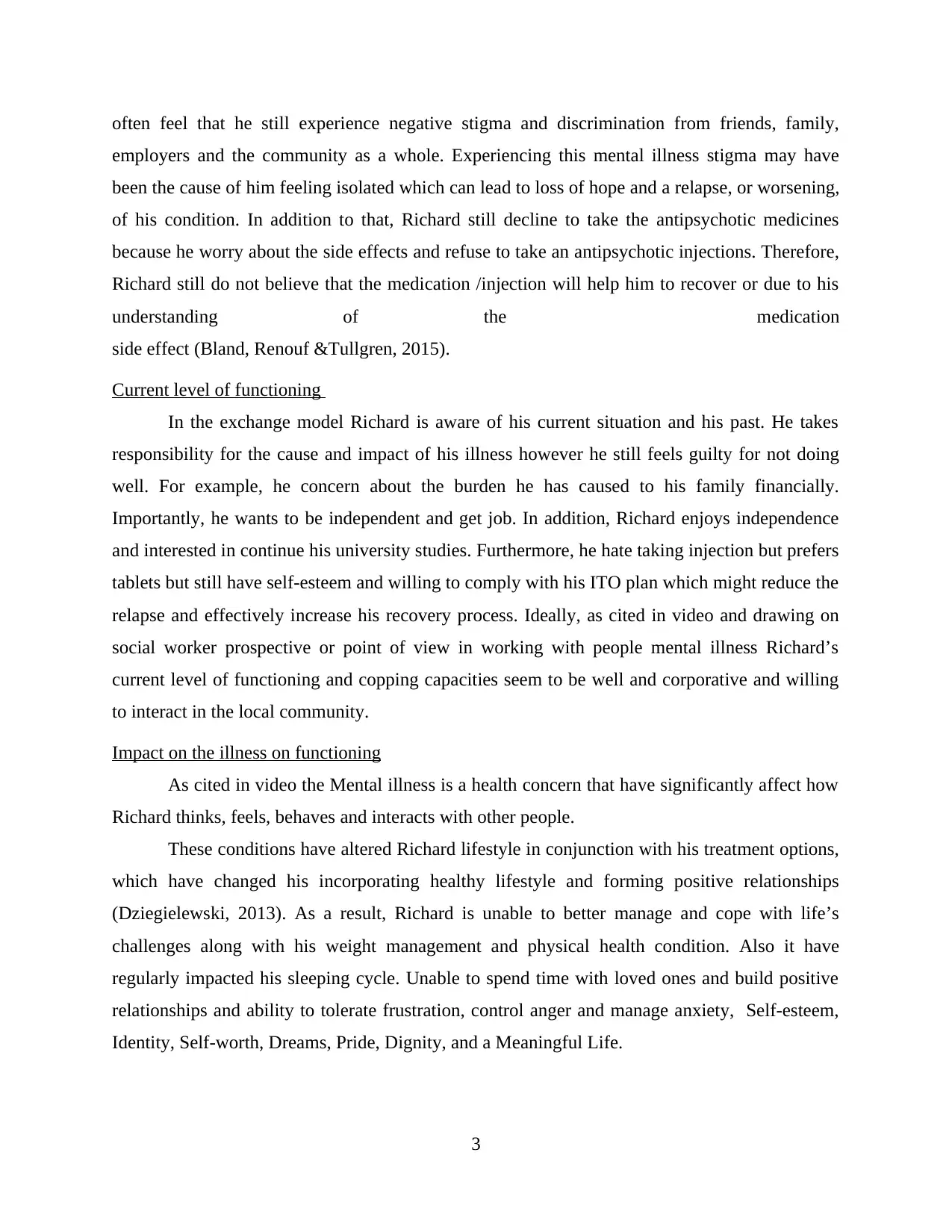
often feel that he still experience negative stigma and discrimination from friends, family,
employers and the community as a whole. Experiencing this mental illness stigma may have
been the cause of him feeling isolated which can lead to loss of hope and a relapse, or worsening,
of his condition. In addition to that, Richard still decline to take the antipsychotic medicines
because he worry about the side effects and refuse to take an antipsychotic injections. Therefore,
Richard still do not believe that the medication /injection will help him to recover or due to his
understanding of the medication
side effect (Bland, Renouf &Tullgren, 2015).
Current level of functioning
In the exchange model Richard is aware of his current situation and his past. He takes
responsibility for the cause and impact of his illness however he still feels guilty for not doing
well. For example, he concern about the burden he has caused to his family financially.
Importantly, he wants to be independent and get job. In addition, Richard enjoys independence
and interested in continue his university studies. Furthermore, he hate taking injection but prefers
tablets but still have self-esteem and willing to comply with his ITO plan which might reduce the
relapse and effectively increase his recovery process. Ideally, as cited in video and drawing on
social worker prospective or point of view in working with people mental illness Richard’s
current level of functioning and copping capacities seem to be well and corporative and willing
to interact in the local community.
Impact on the illness on functioning
As cited in video the Mental illness is a health concern that have significantly affect how
Richard thinks, feels, behaves and interacts with other people.
These conditions have altered Richard lifestyle in conjunction with his treatment options,
which have changed his incorporating healthy lifestyle and forming positive relationships
(Dziegielewski, 2013). As a result, Richard is unable to better manage and cope with life’s
challenges along with his weight management and physical health condition. Also it have
regularly impacted his sleeping cycle. Unable to spend time with loved ones and build positive
relationships and ability to tolerate frustration, control anger and manage anxiety, Self-esteem,
Identity, Self-worth, Dreams, Pride, Dignity, and a Meaningful Life.
3
employers and the community as a whole. Experiencing this mental illness stigma may have
been the cause of him feeling isolated which can lead to loss of hope and a relapse, or worsening,
of his condition. In addition to that, Richard still decline to take the antipsychotic medicines
because he worry about the side effects and refuse to take an antipsychotic injections. Therefore,
Richard still do not believe that the medication /injection will help him to recover or due to his
understanding of the medication
side effect (Bland, Renouf &Tullgren, 2015).
Current level of functioning
In the exchange model Richard is aware of his current situation and his past. He takes
responsibility for the cause and impact of his illness however he still feels guilty for not doing
well. For example, he concern about the burden he has caused to his family financially.
Importantly, he wants to be independent and get job. In addition, Richard enjoys independence
and interested in continue his university studies. Furthermore, he hate taking injection but prefers
tablets but still have self-esteem and willing to comply with his ITO plan which might reduce the
relapse and effectively increase his recovery process. Ideally, as cited in video and drawing on
social worker prospective or point of view in working with people mental illness Richard’s
current level of functioning and copping capacities seem to be well and corporative and willing
to interact in the local community.
Impact on the illness on functioning
As cited in video the Mental illness is a health concern that have significantly affect how
Richard thinks, feels, behaves and interacts with other people.
These conditions have altered Richard lifestyle in conjunction with his treatment options,
which have changed his incorporating healthy lifestyle and forming positive relationships
(Dziegielewski, 2013). As a result, Richard is unable to better manage and cope with life’s
challenges along with his weight management and physical health condition. Also it have
regularly impacted his sleeping cycle. Unable to spend time with loved ones and build positive
relationships and ability to tolerate frustration, control anger and manage anxiety, Self-esteem,
Identity, Self-worth, Dreams, Pride, Dignity, and a Meaningful Life.
3
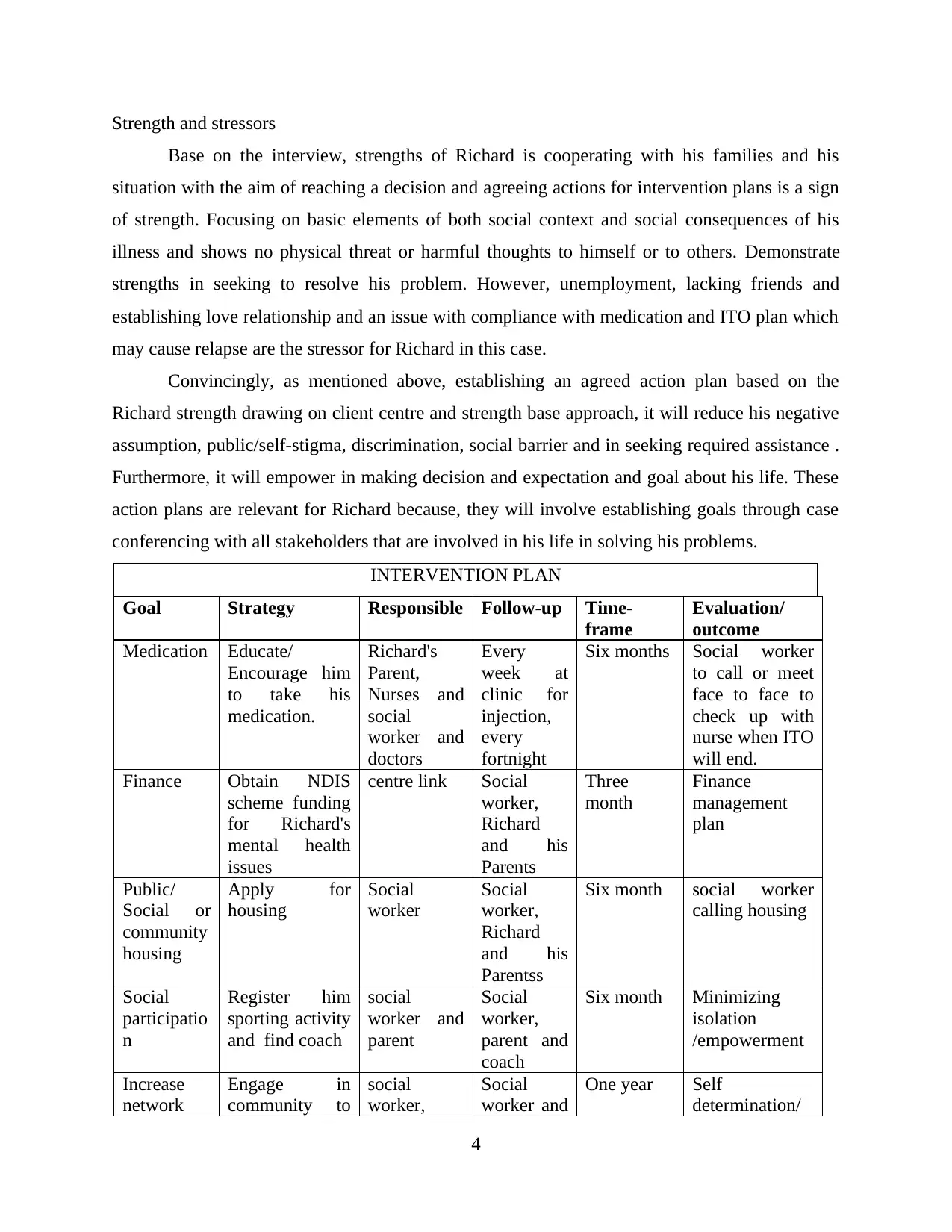
Strength and stressors
Base on the interview, strengths of Richard is cooperating with his families and his
situation with the aim of reaching a decision and agreeing actions for intervention plans is a sign
of strength. Focusing on basic elements of both social context and social consequences of his
illness and shows no physical threat or harmful thoughts to himself or to others. Demonstrate
strengths in seeking to resolve his problem. However, unemployment, lacking friends and
establishing love relationship and an issue with compliance with medication and ITO plan which
may cause relapse are the stressor for Richard in this case.
Convincingly, as mentioned above, establishing an agreed action plan based on the
Richard strength drawing on client centre and strength base approach, it will reduce his negative
assumption, public/self-stigma, discrimination, social barrier and in seeking required assistance .
Furthermore, it will empower in making decision and expectation and goal about his life. These
action plans are relevant for Richard because, they will involve establishing goals through case
conferencing with all stakeholders that are involved in his life in solving his problems.
INTERVENTION PLAN
Goal Strategy Responsible Follow-up Time-
frame
Evaluation/
outcome
Medication Educate/
Encourage him
to take his
medication.
Richard's
Parent,
Nurses and
social
worker and
doctors
Every
week at
clinic for
injection,
every
fortnight
Six months Social worker
to call or meet
face to face to
check up with
nurse when ITO
will end.
Finance Obtain NDIS
scheme funding
for Richard's
mental health
issues
centre link Social
worker,
Richard
and his
Parents
Three
month
Finance
management
plan
Public/
Social or
community
housing
Apply for
housing
Social
worker
Social
worker,
Richard
and his
Parentss
Six month social worker
calling housing
Social
participatio
n
Register him
sporting activity
and find coach
social
worker and
parent
Social
worker,
parent and
coach
Six month Minimizing
isolation
/empowerment
Increase
network
Engage in
community to
social
worker,
Social
worker and
One year Self
determination/
4
Base on the interview, strengths of Richard is cooperating with his families and his
situation with the aim of reaching a decision and agreeing actions for intervention plans is a sign
of strength. Focusing on basic elements of both social context and social consequences of his
illness and shows no physical threat or harmful thoughts to himself or to others. Demonstrate
strengths in seeking to resolve his problem. However, unemployment, lacking friends and
establishing love relationship and an issue with compliance with medication and ITO plan which
may cause relapse are the stressor for Richard in this case.
Convincingly, as mentioned above, establishing an agreed action plan based on the
Richard strength drawing on client centre and strength base approach, it will reduce his negative
assumption, public/self-stigma, discrimination, social barrier and in seeking required assistance .
Furthermore, it will empower in making decision and expectation and goal about his life. These
action plans are relevant for Richard because, they will involve establishing goals through case
conferencing with all stakeholders that are involved in his life in solving his problems.
INTERVENTION PLAN
Goal Strategy Responsible Follow-up Time-
frame
Evaluation/
outcome
Medication Educate/
Encourage him
to take his
medication.
Richard's
Parent,
Nurses and
social
worker and
doctors
Every
week at
clinic for
injection,
every
fortnight
Six months Social worker
to call or meet
face to face to
check up with
nurse when ITO
will end.
Finance Obtain NDIS
scheme funding
for Richard's
mental health
issues
centre link Social
worker,
Richard
and his
Parents
Three
month
Finance
management
plan
Public/
Social or
community
housing
Apply for
housing
Social
worker
Social
worker,
Richard
and his
Parentss
Six month social worker
calling housing
Social
participatio
n
Register him
sporting activity
and find coach
social
worker and
parent
Social
worker,
parent and
coach
Six month Minimizing
isolation
/empowerment
Increase
network
Engage in
community to
social
worker,
Social
worker and
One year Self
determination/
4
Paraphrase This Document
Need a fresh take? Get an instant paraphrase of this document with our AI Paraphraser
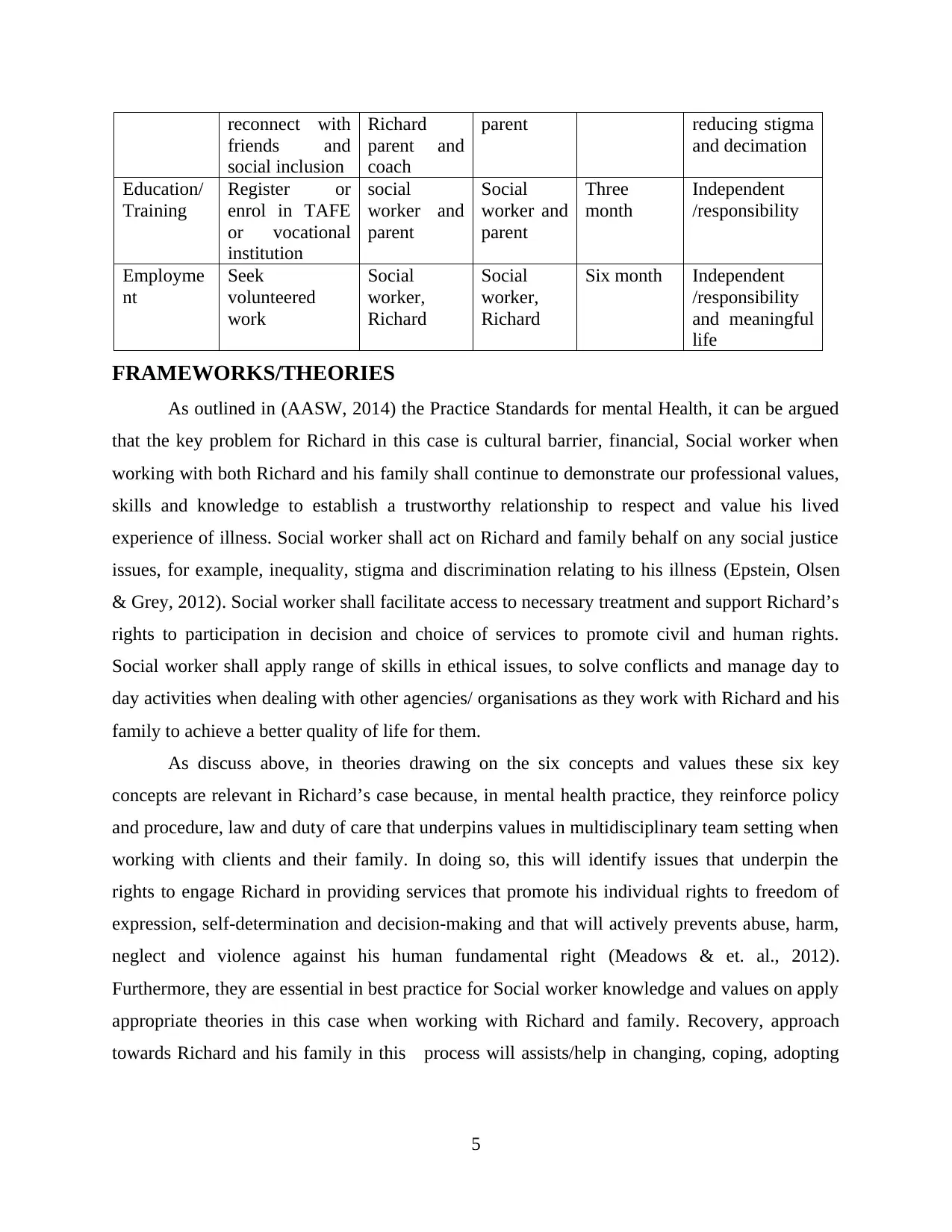
reconnect with
friends and
social inclusion
Richard
parent and
coach
parent reducing stigma
and decimation
Education/
Training
Register or
enrol in TAFE
or vocational
institution
social
worker and
parent
Social
worker and
parent
Three
month
Independent
/responsibility
Employme
nt
Seek
volunteered
work
Social
worker,
Richard
Social
worker,
Richard
Six month Independent
/responsibility
and meaningful
life
FRAMEWORKS/THEORIES
As outlined in (AASW, 2014) the Practice Standards for mental Health, it can be argued
that the key problem for Richard in this case is cultural barrier, financial, Social worker when
working with both Richard and his family shall continue to demonstrate our professional values,
skills and knowledge to establish a trustworthy relationship to respect and value his lived
experience of illness. Social worker shall act on Richard and family behalf on any social justice
issues, for example, inequality, stigma and discrimination relating to his illness (Epstein, Olsen
& Grey, 2012). Social worker shall facilitate access to necessary treatment and support Richard’s
rights to participation in decision and choice of services to promote civil and human rights.
Social worker shall apply range of skills in ethical issues, to solve conflicts and manage day to
day activities when dealing with other agencies/ organisations as they work with Richard and his
family to achieve a better quality of life for them.
As discuss above, in theories drawing on the six concepts and values these six key
concepts are relevant in Richard’s case because, in mental health practice, they reinforce policy
and procedure, law and duty of care that underpins values in multidisciplinary team setting when
working with clients and their family. In doing so, this will identify issues that underpin the
rights to engage Richard in providing services that promote his individual rights to freedom of
expression, self-determination and decision-making and that will actively prevents abuse, harm,
neglect and violence against his human fundamental right (Meadows & et. al., 2012).
Furthermore, they are essential in best practice for Social worker knowledge and values on apply
appropriate theories in this case when working with Richard and family. Recovery, approach
towards Richard and his family in this process will assists/help in changing, coping, adopting
5
friends and
social inclusion
Richard
parent and
coach
parent reducing stigma
and decimation
Education/
Training
Register or
enrol in TAFE
or vocational
institution
social
worker and
parent
Social
worker and
parent
Three
month
Independent
/responsibility
Employme
nt
Seek
volunteered
work
Social
worker,
Richard
Social
worker,
Richard
Six month Independent
/responsibility
and meaningful
life
FRAMEWORKS/THEORIES
As outlined in (AASW, 2014) the Practice Standards for mental Health, it can be argued
that the key problem for Richard in this case is cultural barrier, financial, Social worker when
working with both Richard and his family shall continue to demonstrate our professional values,
skills and knowledge to establish a trustworthy relationship to respect and value his lived
experience of illness. Social worker shall act on Richard and family behalf on any social justice
issues, for example, inequality, stigma and discrimination relating to his illness (Epstein, Olsen
& Grey, 2012). Social worker shall facilitate access to necessary treatment and support Richard’s
rights to participation in decision and choice of services to promote civil and human rights.
Social worker shall apply range of skills in ethical issues, to solve conflicts and manage day to
day activities when dealing with other agencies/ organisations as they work with Richard and his
family to achieve a better quality of life for them.
As discuss above, in theories drawing on the six concepts and values these six key
concepts are relevant in Richard’s case because, in mental health practice, they reinforce policy
and procedure, law and duty of care that underpins values in multidisciplinary team setting when
working with clients and their family. In doing so, this will identify issues that underpin the
rights to engage Richard in providing services that promote his individual rights to freedom of
expression, self-determination and decision-making and that will actively prevents abuse, harm,
neglect and violence against his human fundamental right (Meadows & et. al., 2012).
Furthermore, they are essential in best practice for Social worker knowledge and values on apply
appropriate theories in this case when working with Richard and family. Recovery, approach
towards Richard and his family in this process will assists/help in changing, coping, adopting
5
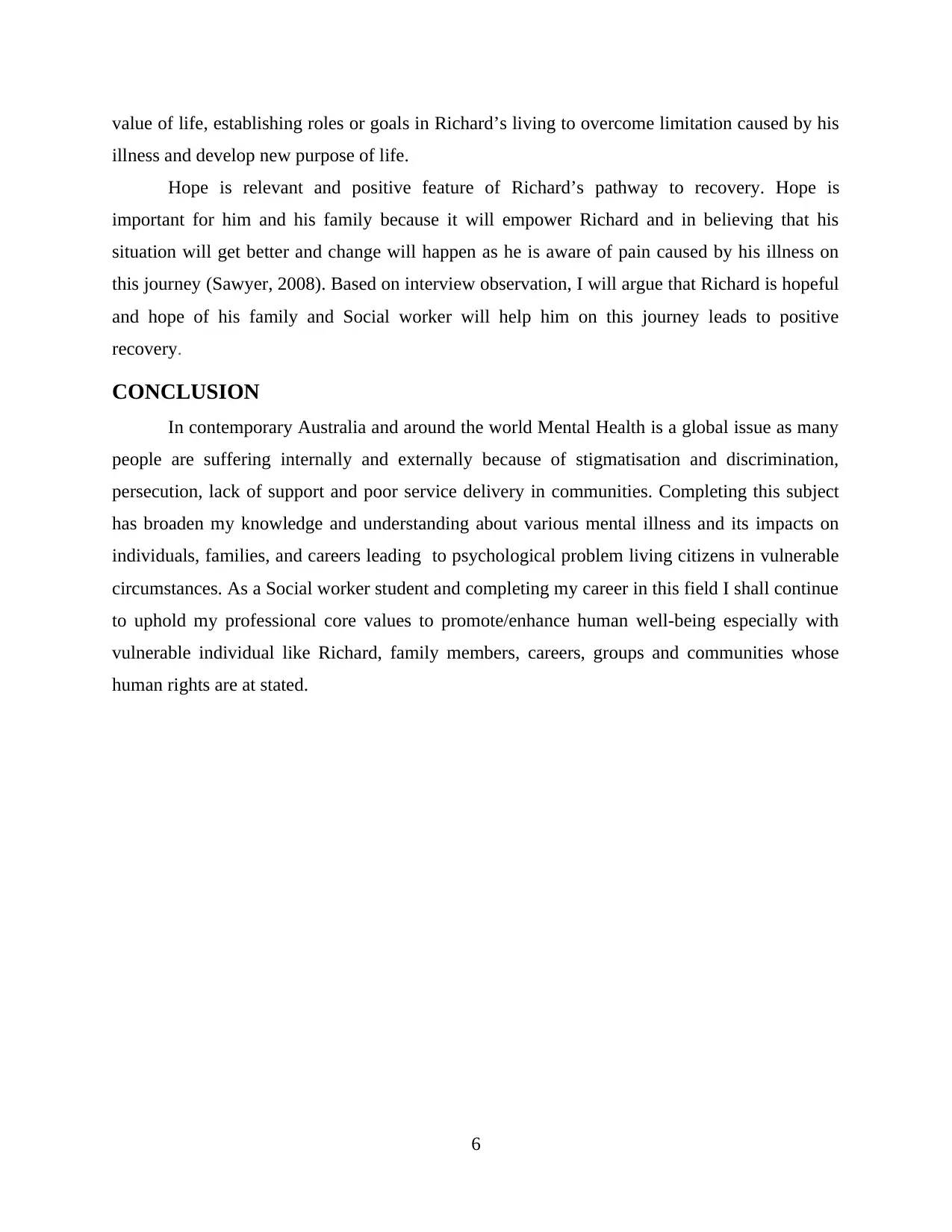
value of life, establishing roles or goals in Richard’s living to overcome limitation caused by his
illness and develop new purpose of life.
Hope is relevant and positive feature of Richard’s pathway to recovery. Hope is
important for him and his family because it will empower Richard and in believing that his
situation will get better and change will happen as he is aware of pain caused by his illness on
this journey (Sawyer, 2008). Based on interview observation, I will argue that Richard is hopeful
and hope of his family and Social worker will help him on this journey leads to positive
recovery.
CONCLUSION
In contemporary Australia and around the world Mental Health is a global issue as many
people are suffering internally and externally because of stigmatisation and discrimination,
persecution, lack of support and poor service delivery in communities. Completing this subject
has broaden my knowledge and understanding about various mental illness and its impacts on
individuals, families, and careers leading to psychological problem living citizens in vulnerable
circumstances. As a Social worker student and completing my career in this field I shall continue
to uphold my professional core values to promote/enhance human well-being especially with
vulnerable individual like Richard, family members, careers, groups and communities whose
human rights are at stated.
6
illness and develop new purpose of life.
Hope is relevant and positive feature of Richard’s pathway to recovery. Hope is
important for him and his family because it will empower Richard and in believing that his
situation will get better and change will happen as he is aware of pain caused by his illness on
this journey (Sawyer, 2008). Based on interview observation, I will argue that Richard is hopeful
and hope of his family and Social worker will help him on this journey leads to positive
recovery.
CONCLUSION
In contemporary Australia and around the world Mental Health is a global issue as many
people are suffering internally and externally because of stigmatisation and discrimination,
persecution, lack of support and poor service delivery in communities. Completing this subject
has broaden my knowledge and understanding about various mental illness and its impacts on
individuals, families, and careers leading to psychological problem living citizens in vulnerable
circumstances. As a Social worker student and completing my career in this field I shall continue
to uphold my professional core values to promote/enhance human well-being especially with
vulnerable individual like Richard, family members, careers, groups and communities whose
human rights are at stated.
6
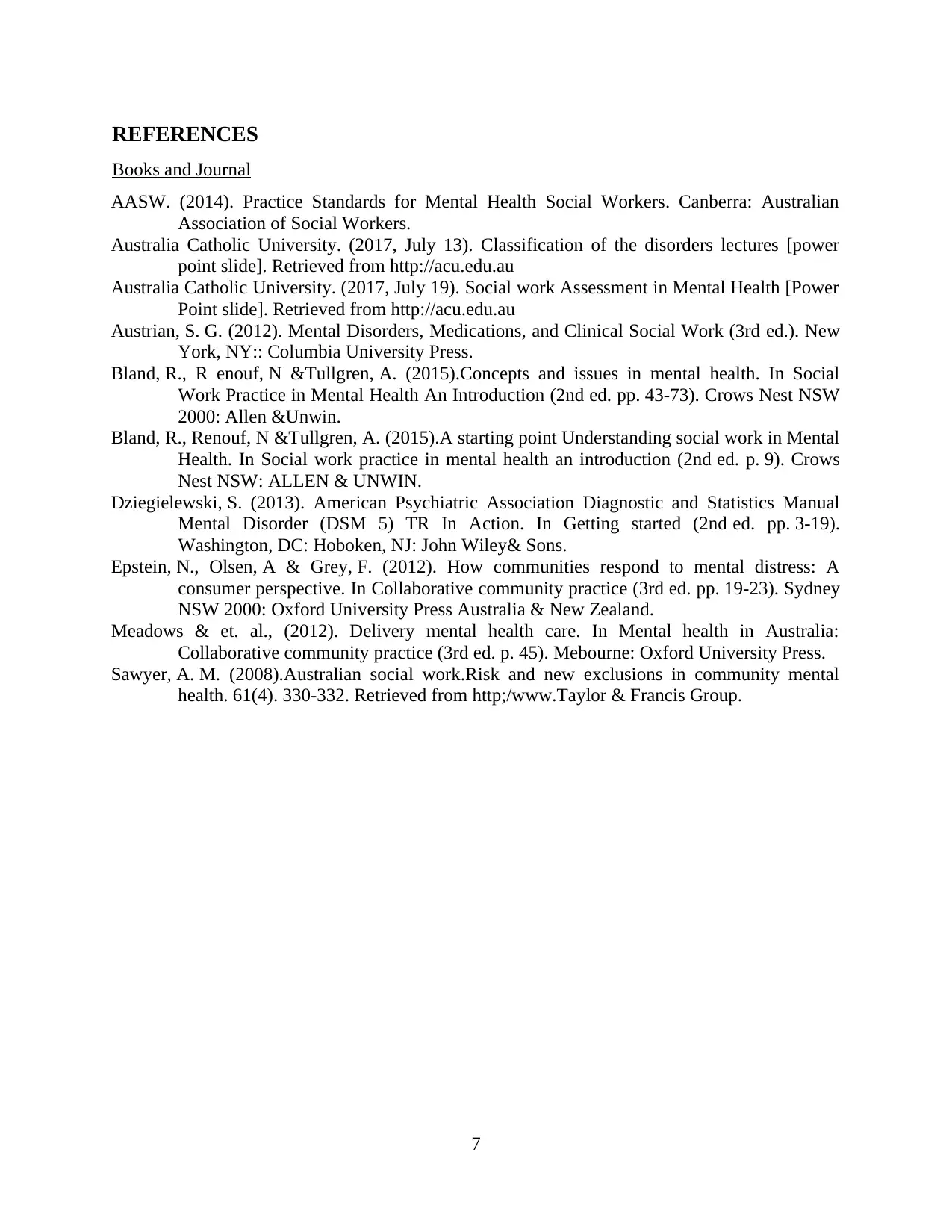
REFERENCES
Books and Journal
AASW. (2014). Practice Standards for Mental Health Social Workers. Canberra: Australian
Association of Social Workers.
Australia Catholic University. (2017, July 13). Classification of the disorders lectures [power
point slide]. Retrieved from http://acu.edu.au
Australia Catholic University. (2017, July 19). Social work Assessment in Mental Health [Power
Point slide]. Retrieved from http://acu.edu.au
Austrian, S. G. (2012). Mental Disorders, Medications, and Clinical Social Work (3rd ed.). New
York, NY:: Columbia University Press.
Bland, R., R enouf, N &Tullgren, A. (2015).Concepts and issues in mental health. In Social
Work Practice in Mental Health An Introduction (2nd ed. pp. 43-73). Crows Nest NSW
2000: Allen &Unwin.
Bland, R., Renouf, N &Tullgren, A. (2015).A starting point Understanding social work in Mental
Health. In Social work practice in mental health an introduction (2nd ed. p. 9). Crows
Nest NSW: ALLEN & UNWIN.
Dziegielewski, S. (2013). American Psychiatric Association Diagnostic and Statistics Manual
Mental Disorder (DSM 5) TR In Action. In Getting started (2nd ed. pp. 3-19).
Washington, DC: Hoboken, NJ: John Wiley& Sons.
Epstein, N., Olsen, A & Grey, F. (2012). How communities respond to mental distress: A
consumer perspective. In Collaborative community practice (3rd ed. pp. 19-23). Sydney
NSW 2000: Oxford University Press Australia & New Zealand.
Meadows & et. al., (2012). Delivery mental health care. In Mental health in Australia:
Collaborative community practice (3rd ed. p. 45). Mebourne: Oxford University Press.
Sawyer, A. M. (2008).Australian social work.Risk and new exclusions in community mental
health. 61(4). 330-332. Retrieved from http;/www.Taylor & Francis Group.
7
Books and Journal
AASW. (2014). Practice Standards for Mental Health Social Workers. Canberra: Australian
Association of Social Workers.
Australia Catholic University. (2017, July 13). Classification of the disorders lectures [power
point slide]. Retrieved from http://acu.edu.au
Australia Catholic University. (2017, July 19). Social work Assessment in Mental Health [Power
Point slide]. Retrieved from http://acu.edu.au
Austrian, S. G. (2012). Mental Disorders, Medications, and Clinical Social Work (3rd ed.). New
York, NY:: Columbia University Press.
Bland, R., R enouf, N &Tullgren, A. (2015).Concepts and issues in mental health. In Social
Work Practice in Mental Health An Introduction (2nd ed. pp. 43-73). Crows Nest NSW
2000: Allen &Unwin.
Bland, R., Renouf, N &Tullgren, A. (2015).A starting point Understanding social work in Mental
Health. In Social work practice in mental health an introduction (2nd ed. p. 9). Crows
Nest NSW: ALLEN & UNWIN.
Dziegielewski, S. (2013). American Psychiatric Association Diagnostic and Statistics Manual
Mental Disorder (DSM 5) TR In Action. In Getting started (2nd ed. pp. 3-19).
Washington, DC: Hoboken, NJ: John Wiley& Sons.
Epstein, N., Olsen, A & Grey, F. (2012). How communities respond to mental distress: A
consumer perspective. In Collaborative community practice (3rd ed. pp. 19-23). Sydney
NSW 2000: Oxford University Press Australia & New Zealand.
Meadows & et. al., (2012). Delivery mental health care. In Mental health in Australia:
Collaborative community practice (3rd ed. p. 45). Mebourne: Oxford University Press.
Sawyer, A. M. (2008).Australian social work.Risk and new exclusions in community mental
health. 61(4). 330-332. Retrieved from http;/www.Taylor & Francis Group.
7
1 out of 10
Related Documents
Your All-in-One AI-Powered Toolkit for Academic Success.
+13062052269
info@desklib.com
Available 24*7 on WhatsApp / Email
![[object Object]](/_next/static/media/star-bottom.7253800d.svg)
Unlock your academic potential
© 2024 | Zucol Services PVT LTD | All rights reserved.





